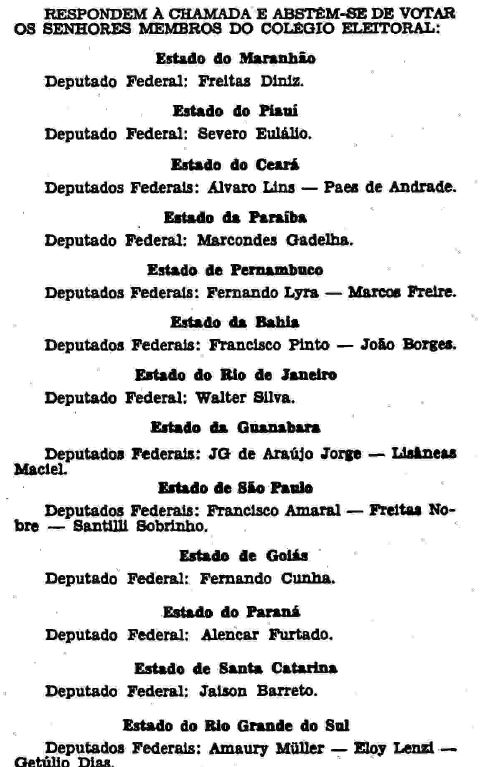January 15, 1974 was the biggest day Congress had seen in years. Just over five years before, on December 13, 1968, Brazil’s military dictatorship had closed Congress for refusing to allow the generals to prosecute a rebellious opposition deputy. When it reopened 10 months later, it was with much of the opposition party purged, with only its most docile members left to “oppose” the regime. For the next four years the military ruled virtually unopposed, save for a few leftist guerillas, most of whom were killed, imprisoned and tortured, or forced into exile abroad. Meanwhile, aided by civilian technocrats and a subservient Congress, the military engineered half a decade of double-digit economic growth referred to as the “Brazilian miracle.” For its part, the sole opposition party, the Movimento Democrático Brasileiro (MDB), suffered debilitating losses in the 1970 legislative and 1972 local elections and considered folding. Political scientists at home and abroad debated whether Brazil’s regime was approaching “institutionalization.”
At this moment, Congress and representatives of the state legislatures were called to indirectly “elect” the next President to a five-year term, as stipulated by the regime’s 1969 constitution. Due to purges and electoral routs, the regime-allied party, the Aliança Renovadora Nacional (ARENA) would easily elect the regime’s chosen candidate. Yet the opposition chose to make a gesture of protest by nominating São Paulo deputy Ulysses Guimarães to run as an “anti-candidate,” exposing the meaninglessness of the election. Yet a more radically confrontational group of younger MDB deputies who had been elected against the odds in 1970 demanded that Guimarães renounce his candidacy on the eve of the vote.
Guimarães and the party leadership refused to honor their request, fearing that the military might see this defiant gesture as too confrontational. The group of younger deputies, who called themselves the autênticos, then took matters into their own hands. On the day of the vote, they appeared in the Câmara with their fellow legislators. They demanded that they be allowed to read a brief statement justifying their actions before the vote. When the moment came during the state-by-state roll call, in one of the most courageous moments Congress would see during the dictatorship, each of the autênticos stood and announced that he refused to vote. Their own party could have removed them, for failing to follow the party leadership’s directives. They could easily have been purged from Congress themselves, perhaps even been arrested, tortured, or disappeared by the regime; it had already happened, after all, to Rubens Paiva, a fellow deputy purged in 1964. Yet they stood, and in a clear, calm voice, announced that they refused to meekly follow orders. As they presciently put it in their written statement, “The Brazil that lives today in the silence of factories, offices, fields, schools, and churches will understand us, and the Fatherland of tomorrow will be able to do justice to the few who assumed the risk of combining their gesture of nonconformity with the protest of their voice.”
But other than the written statement, which was duly transcribed, none of this appears in the official minutes. Instead, the hour-long vote is condensed into a two-page summary that merely lists the electors who voted for General Ernesto Geisel, the electors who voted for Guimarães, and the autênticos, whose votes were recorded as abstentions, despite their insistence that they were refusing to vote, not abstaining.
But what did these 21 men actually say as they voted, if anything? Press reports indicated that they expressed their dissatisfaction, but their exact words, the amount of conviction in their voice, whether they expressed themselves loudly or quietly – all of this is left out of the transcript. Yet it is in the recording. When we combine their brief statements into a single file, this is what we hear:
In this remarkable series of votes, we gain access to voices that history had silenced. Their written statement appeared in the Diário do Congresso Nacional, but the regime’s censors prohibited its publication in newspapers. They could have followed along and voted as their party directed that day; that was, after all, what the regime’s “law of party fidelity” required. Yet in addition to flouting the will of the opposition party, they were defying the generals, who wanted the “election” to show to the world that Brazil was, in fact, a democracy in which the opposition accepted the rules.
Each reads a version of a prepared statement that they had clearly coordinated among themselves. “I refuse to vote, according to the terms of the declaration that I signed, which was submitted to the Câmara leadership.” Yet there are many variations among them. Some make their statement in a loud, clear voice, full of the certainty that they were doing what was right. Others do not speak into a microphone, and so their voices are not clearly audible; one’s vote is so short (merely four of five seconds) that there was no time for him to have said anything; it is likely that he simply sat or stood, perhaps with his arms folded, refusing to say anything. Others improvised by adding their own twist to the prepared statement. Fernando Lyra, Freitas Nobre, and Amaury Müller all refer to the absence of the Brazilian people from this election. Francisco Pinto, Walter Silva, JG de Araújo Jorge, and Nobre condemn the regime’s censorship in the press of their written statement. Santilli Sobrinho says, “I belong to an electoral college, and not to one that makes endorsements that cannot be appealed. Thus, I refuse to vote.” Throughout, the exasperation of the regime’s allies with their autêntico opposition colleagues is clear, as Senator Paulo Torres, who presided over the electoral college, overrides the complaint of the first autêntico, Freitas Diniz, that he is refusing to vote, not abstaining. With each autêntico vote, Torres records their abstention in a tone of voice that approaches a sigh.
